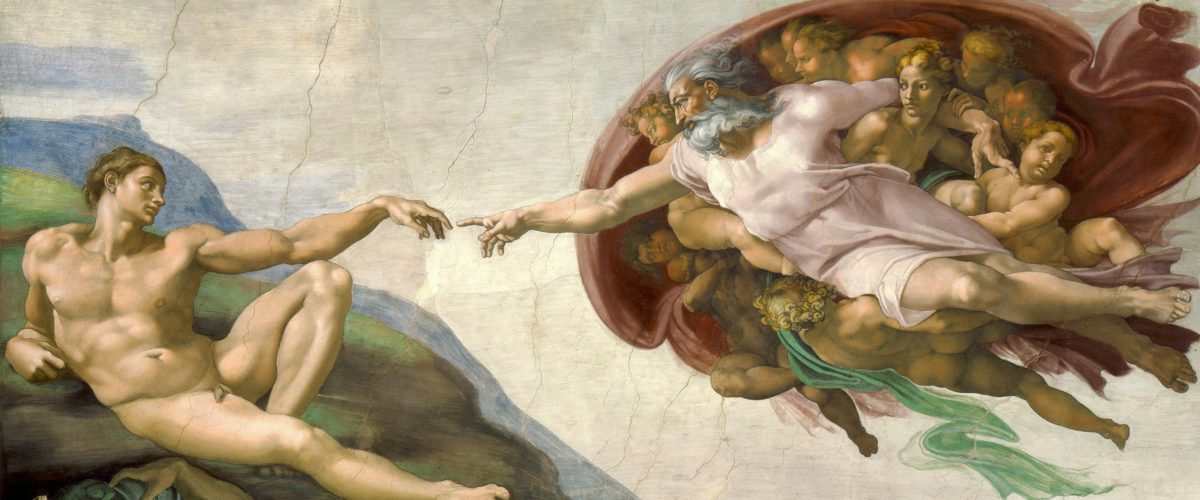How our view of creation and incarnation shape our view of intersex people
This article originally appeared at Baptist News Global on January 18, 2023.
Every disconnection from communal wholeness goes back to a disconnection within the self, which is fundamentally experienced in bodies. So the way Christians talk about Jesus being born as a human body has the potential to shape either wholeness or disconnection from self and neighbor.
Perhaps no other community has been hurt by this theology fueled disconnection more than intersex people.
Intersex people have bodies that are different from the male and female bodies most of us are accustomed to having. Some intersex people may have genitals that are typical of both male and female bodies, including having both ovarian and testicular tissues simultaneously. Others may have chromosomes that are different from what would be expected for their physical appearance and may never know they are intersex.
While many people have not considered this reality, intersex bodies are common in a variety of species.
Because all theology is ultimately an exercise of faith, it lives within a spectrum ranging from speculation to interpretation. But whether our theology is accurate or not is beside the point. What matters is that the way Christians talk about theology, especially regarding the incarnation of God being born in the body of Jesus, affects the communal wholeness of intersex people.
The incarnation as reaction to brokenness
Conservative evangelicals have been shaped by a cosmo-theological narrative of Creation, Fall, Redemption and Restoration. They believe God created everything perfectly whole, but that sin entered the world and brought brokenness, especially experienced in human bodies and sexuality. Then they believe Jesus came as a reaction to our brokenness to redeem some of our souls and that he eventually will return again to restore Christian bodies back to original perfection.
“This narrative frames the incarnation of Jesus as a reaction to brokenness and frames the identities of our bodies and sexuality as broken.”
Besides its obvious disconnections from evolutionary reality, this narrative frames the incarnation of Jesus as a reaction to brokenness and frames the identities of our bodies and sexuality as broken. And this is why so many believe LGBTQ people, as well as intersex people, are manifestations of brokenness.
In an article at The Gospel Coaltion, Denny Burk called intersex people a “morally confounding situation,” an “ethical challenge,” and a “problem.” Rather than offering any helpful thoughts, Burk responded by lamenting progressive and liberal Christians committing a “sustained assault on what the Bible teaches about gender and sexuality” in a “Bible-ignoring zeitgeist.”
In other words, the net result of The Gospel Coalition’s response to intersex people is universal disconnection.
The incarnation as overflowing love
But there is another view of the incarnation that is older than evangelicalism. Denis Edwards, who was a priest as well as a professor for The Catholic Theological College, notes: “In one view, the incarnation is thought to have been caused as a remedy for human sin. In the other, associated with Franciscan theology, particularly Duns Scotus (c. 1266-1308), God’s plan of creation always had the incarnation of Christ as its center.” Or as the modern Franciscan friar Richard Rohr says in The Universal Christ, “God loves things by becoming them.”
“When we see intersex people in light of an incarnation of overflowing love, we no longer experience brokenness, but infinite wholeness.”
To frame the incarnation as God’s becoming human in overflowing love is to affirm the goodness of human bodies and sexuality and the fulness of God experienced in them. And thus, when we see intersex people in light of an incarnation of overflowing love, we no longer experience brokenness, but infinite wholeness.
The incarnation as the intersex body of God
Conservative evangelicals believe gender and sexually binary distinctions are rooted in creation itself, which is a reflection of a distinct God. They often will go so far as to demand that all members of the Trinity be referred to with exclusively he/him pronouns.
But if conservative evangelicals would be consistent in their literal interpretation of the Bible, they would discover in Jesus the intersex body of God.










Leave a Reply
Want to join the discussion?Feel free to contribute!